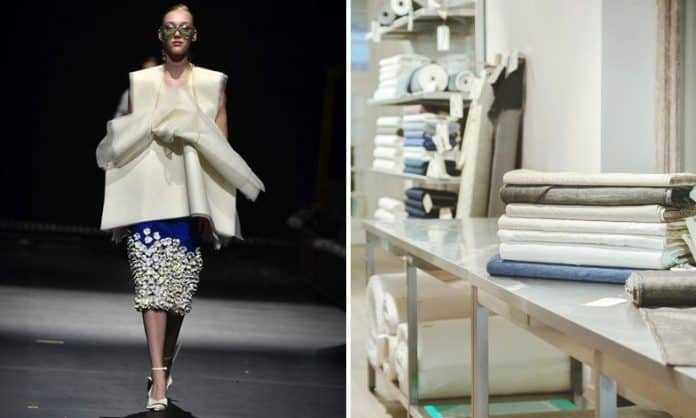The fashion industry is estimated to be responsible for up to 8 % of global greenhouse gas emissions, with clothing production doubling in the past 15 years.
Urgent action is needed as its impact on the environment continues to grow. On average, EU textile consumption has the fourth highest impact on the environment and climate change, after food, housing and mobility.
Following UNEP’s recent high-level “Threads of Change” event in Brussels, UNRIC interviewed the co-founders of Bakermat, a Belgian company aiming to empower designers to create sustainable products.

Bakermat, meaning place of origin in Dutch, was co-founded by fashion designers Cédric Jacquemyn and Quinten Schaap as a place that combines different textile suppliers under one roof, reflecting the sense of home. The store’s selection of materials supports cooperation between designers and suppliers, ranging from small Indian companies representing handweavers who recycle leftovers to a heritage Italian company producing the Popes’ garments.
The store, its walls bordered with shelves showcasing different fabrics, including Japanese denim, Italian heritage silk, recycled jeans, or hand-woven silk from India, is in the heart of Antwerp’s fashion district.
“It is important that we are located in the city centre between all the other clothing shops selling finished products. That way, we give a little bit more insight into the story that goes before it becomes a piece of clothing,” Schaap says.
Both founders believe that sustainability starts with education and raising awareness about the value of materials and the people behind their production. With technology, they want to bring in another tool to become more sustainable.
Digital technology’s role
Bakermat uses 3D software to visualise fabrics online, allowing designers to create fittings digitally. This reduces the need for multiple physical prototypes, improving efficiency and reducing waste.
“Designers would still need to make a final prototype physically, but the three or four prototypes they normally create before that, can be skipped. It is a more efficient way of working in the fashion industry,” Schaap said.
Educational Impact
Bakermat works closely with the Royal Academy in Antwerp and wants to positively impact the textile industry by allowing fashion students to include digitalisation in their work, providing them with sustainable materials and organising workshops and events to connect students with textile mills.
Through talks in the store, a fabric fair Bakermat brings to schools and collaborations with universities, the team aims to raise awareness and provide information about the materials in order to integrate sustainability from the beginning.
The store has also expanded its cooperation beyond fashion, collaborating with dance companies and the Royal Opera.
Industry future
Jacquemyn sees “a shift towards increased use of recycled cotton and wool and a focus on sustainability and investment”, but highlights “greenwashing needs to be addressed”.
In that context, the UN Economic Commission for Europe (UNECE) launched a Community of Practice in June 2024 to enhance traceability and transparency in the garment and footwear industries and scale up best practices.
Schaap emphasises “transparency and traceability” as essential changes needed in the textile industry to achieve sustainable fashion. In the context of increased digitalisation, he highlights the upcoming European Digital Product Passport, which will enter into force on 18 July 2024. This digital identity card for products will store sustainability information for the product’s entire supply chain.
Citizen and policy maker roles
Jacquemyn believes consumers can drive change by “making informed choices about the materials and brands they support”.
At the latest United Nations Environment Assembly (UNEA-6), governments pushed for systemic changes to promote resource efficiency and circularity.
Jacquemyn remains positive. “I hope there will still be space for small companies and companies preserving heritage that allow designers to make their best choices.”
“Dialogue, communication, and teamwork are required to address complex problems in the industry,” Schaap concluded.
More information:
- Textile industry: how can we make it more sustainable?
- UN Alliance for Sustainable Fashion
- Conscious Fashion and Lifestyle Network
- UNFCCC – About the Fashion Industry Charter for Climate Action
- UNECE – Forests for Fashion
The inclusion of an organisation on the United Nations Regional Information Centre (UNRIC) website does not necessarily reflect UNRIC’s views and does not imply its endorsement.




